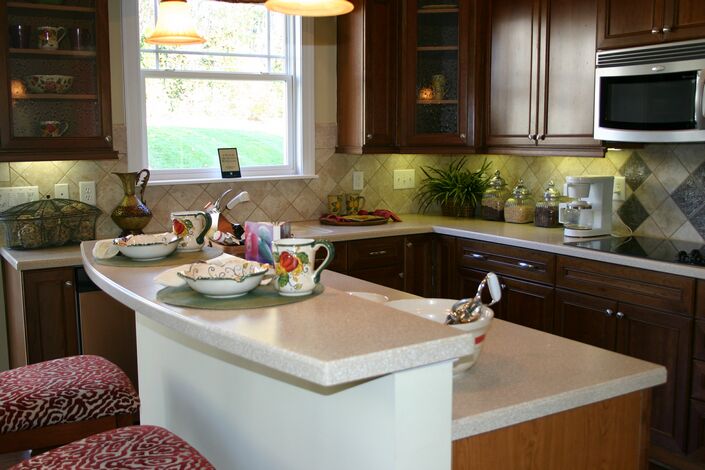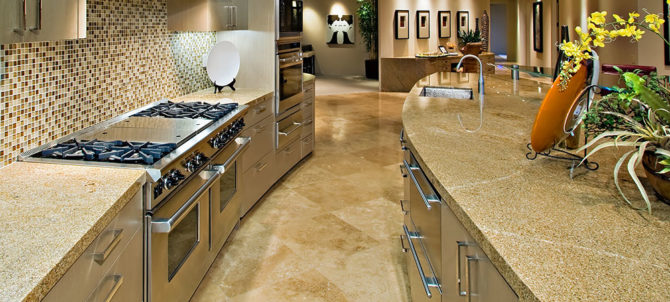
Thinking of adding quartz countertops to your space? Great move because these countertops have been capturing the attention of many not only for their visual appeal but also for their resistance to staining and durability. As a homeowner, you will also appreciate that they are low-maintenance as well.
Now, because quartz countertops are mostly installed in kitchens and bathrooms, you may be wondering if yours coming into contact with hot water may be a problem. Well, that depends on how often that happens and for how long the water sits on the surface.
In this article, we will explore the composition of quartz countertops, their heat resistance, and debunk common myths surrounding their invincibility.
Understanding quartz countertops
To understand the effect of hot water on your quartz countertop, you need to understand its composition first. They are usually made from stone, comprising a huge percentage of crushed quartz crystals mixed with polymers, resins, and pigment.
When all these are mixed, the result is a beautiful, non-porous material that you call a quartz surface.
What is the heat resistance of quartz?
Surely, even with its impressive heat-resistant abilities, quartz has to have a certain temperature degree that will make it crack.
True to this, the material can only handle temperatures of 150 degrees Celsius before showing signs of damage. This high tolerance can be attributed to the resin contained in quartz.
The myth of invincibility
Most people misconstrue quartz to be indestructible, which is also why most people choose it for their kitchens and bathrooms. You should note that quartz has a breaking point where it cannot withstand stress. Exposure to extremely high temperatures may cause it to falter.
As such, it is important to understand the potential risks as well as employ the necessary measures to ensure that your quartz countertop maintains its beauty and durability.
The reality of thermal shock
Now, while your quartz countertop can very well resist heat, it is susceptible to thermal shock. This is when there is a sudden change in extreme temperatures.
Simply put, if you expose your quartz countertop to extremely high or cold temperatures, it may experience thermal stress that will in turn, cause cracks, chips, or worse still, damage to the structural integrity of your countertop.
Practical considerations
With the myth about quartz being indestructible out of the way, it is necessary to be cautious with yours. While occasional exposure to hot crockery may not cause much or immediate harm, constantly subjecting your quartz surface to extreme temperatures will be detrimental.
Therefore, you may find it useful to employ responsibility when using your quartz surface to extend its life.
Importance of trivets and hot pads
Although a quartz countertop is durable, practicing proper maintenance is crucial, and the best part is that it’s not taxing.
The most you would have to do is place trivets and hot pads on top of your surface to create a barrier. What this does is that it reduces the chances of thermal shock when the surface comes into direct contact with your hot pans or boiling water.
Effects of boiling water: Immediate vs. long-term
At this point, you already know that pouring hot water on a quartz surface is unlikely to cause damage immediately owing to its heat-resistant properties.
Nonetheless, you must not take this for granted. Rather, you must be careful not to allow your surface to suffer the long-term effects of doing the same.
Extended exposure of your quartz countertop to hot water can compromise the countertop’s resin and lead to structural damage, surface dullness, and discoloration.
Mitigating risks
Like any other homeowner, you may want to reduce the risks that may compromise your quartz countertop’s longevity and visual appeal, right? Here’s how to do that.
1. Avoid direct heat
As previously mentioned, you want to avoid placing hot cookware directly from the stove or oven onto the quartz surface. This is because direct exposure may lead to thermal shock which will compromise the resins in your quartz countertop and ultimately cause structural damage.
2. Clean spills promptly
While it is normal to have spillages in the kitchen or bathroom, you want to avoid damaging your countertop by promptly cleaning them up. This is particularly important if it is a hot liquid spillage. Your quick action is what will minimize the likelihood of your quartz surface getting damaged.
Debunking common quartz countertop myths
There are some common myths regarding quartz countertops. Debunking them will help ensure that you get the most out of yours.
Myth 1: Quartz is indestructible
Yes, quartz is durable and can resist a lot, but that does not mean that it is invincible. In that regard, you want to put in place the right maintenance practices that will guarantee the extended life of your quartz countertop.
Myth 2: Boiling water causes immediate damage
Accidental or purposeful pouring of hot water on your quartz countertop should not cause panic. This is because the material has remarkable heat-resistant abilities.
While this is the case, frequent exposure to hot water or other liquids is detrimental and may ultimately affect the structural integrity of the quartz.
Generally, quartz countertops can withstand temperatures up to 150 degrees Celsius (300 degrees Fahrenheit) without immediate damage.
It is no wonder that they are a popular choice among homeowners for areas like the kitchen where heat is involved.
As you may have guessed, knowing and respecting these temperature limits is what will make the difference between a long-lasting countertop and one that weakens after a short while.
Conclusion
Pouring hot water on your quartz kitchen countertops NC is not something that you should make a habit. If you do, you risk compromising its durability, beauty, and color. Instead, you should think of it as an occasional occurrence that perhaps happens accidentally. Moreover, you should clean up the spillage as soon as it happens.
Ultimately, quartz countertops can handle only up to 150 degrees Celsius of temperature. Anything beyond that is detrimental, especially in the long run.

